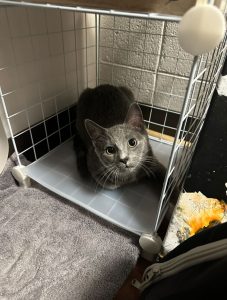Going to college and moving away from home, especially pets, can be difficult, often leaving some homesick.
NIU allows students to submit an Accommodation Request along with proper documentation from the Disability and Resource Center to allow students the privilege to have a registered Emotional Support Animal in the dorms with them.
Chase is NIU’s official therapy dog, he’s a Golden Retriever. All students and staff are allowed to meet with Chase and relax with him in the Peters Life Campus Building Room 150. For information on Chilling with Chase dates check the NIU website.
Interacting with animals can have positive effects such as relieving stress. Angela Kaminski, Chase’s owner, talked about having to get certified as a therapy dog handler. She talked about different events Chase helps out with.
Kaminski also mentioned student organizations often request Chase for events such as stress events, around finals and other student events.
According to a study by Washington State University, students were allowed to participate in a similar program where students were able to interact with dogs and cats to help relieve stress. Knowing there is a non-judgmental companion nearby can be comforting and distracting from stressful situations.
“After getting my cat, I felt more relaxed before going to class which I am normally anxious for,” Andrew Banks, a junior business major, said. “They like to sit on my shoulder while I do homework and cuddle me while I play Sonic which is really comforting and often puts me to sleep.”
For off-campus students or commuters, a furry animal to engage with during stressful times like exams may be the thing to calm an anxious mind.
“Animal involvement in educational settings may lead to students’ enhanced social-emotional development through various paths, including motivation and/or self-efficacy toward learning, engagement and/or attention to educational activities, self-regulation and coping with academic stress, and social interaction with other humans,” according to a study published in Sage Journals.

It’s important to know there’s potential benefits to having ESAs in a school environment if students abide by regulations and policies. Other residents may have allergies or fears related to animals, so it’s essential to ensure the presence of an ESA is well-managed and agreed upon by the school faculty and the student.
It’s crucial to establish a transparent process for students while addressing any concerns or conflicts that may arise due to the presence of an ESA. Once all is completed and approved by faculty such as the DRC and housing, only then will students be allowed to have an ESA in the residence halls.








